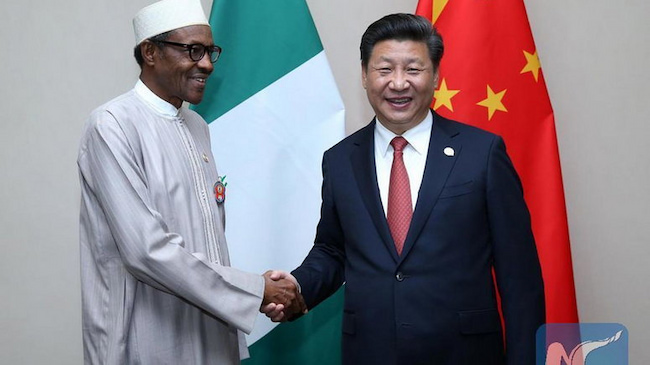To monitor its nationals abroad, the government of China under President Xi Jin Ping has established “overseas police stations” to “crackdown on all forms of unlawful and criminal activities involving Chinese.”
In its most recent study, “110 Overseas Chinese Transnational Policing Gone Wild,” the human rights organization Safeguard Defenders claims that the stations were set up around the world, including in Africa, Europe, and America.
“Rather than cooperating with local authorities in the full respect of territorial sovereignty, it prefers…to cooperate with (United Front-linked) overseas ‘NGOs’ or ‘civil society associations’ across the five continents, setting up an alternative policing and judicial system within third countries, and directly implicating those organisations in the illegal methods employed to pursue ‘fugitives’,” said the rights watchdog.
According to the report, China has established “police stations” in Lesotho and Tanzania in addition to Nigeria as part of its global network.
The article stated that Chinese officials claimed that from April 2021 to July 2022, 230,000 nationals had been “persuaded to return” to face criminal procedures in China as part of a significant statewide drive to combat fraud and telecommunication fraud by Chinese individuals residing overseas.
In a full-fledged “guilt by association” campaign, China’s official pronouncements described the use of withholding suspects’ children’s right to study in China and other steps against relatives and family members.
In a speech to the nation on Sunday, President Xi Jinping declared that fighting corruption is the most thorough form of self-reform available and that it is necessary as long as “the breeding grounds and conditions for corruption still exist.” He added that we must continue sounding the bugle and never rest, not even for a minute, in our fight against corruption.
The rights organization stated that China has banned Chinese people from entering any of the nine nations it had identified as having severe cases of fraud, telecom fraud, and online crimes.
Furthermore, Safeguard Defenders pointed out that fast mounting evidence supported the deployment of large web campaigns, “Overseas Police Service Stations,” and local “Chinese Overseas Home Associations” tied to the CCP’s United Front Work in these activities across five continents.
The human rights report states that these activities “eschew official bilateral police and judicial collaboration, violate international law, and may threaten the territorial integrity of third nations participating in putting up a parallel policing organization employing unlawful techniques.”
“While establishing these operations to hunt down those accused of fraud and telecommunications fraud, China identified nine countries particularly prone to hosting Chinese nationals engaging in such criminal activities, the ‘nine forbidden countries’,” the Safeguard explained.
However, the setting up of overseas police ‘service stations’ was a worldwide phenomenon, with the majority of such being in western democratic nations, with a particular focus on Europe, and not in the ‘nine forbidden countries’.
As documents identified by Safeguard Defenders showed, such overseas police “service stations” had been used by police back in China to carry out such “persuasion to return,” operations on foreign soil, including in Europe.
However, the rights group noted that abandoning any “pretext of due process or the consideration of suspects’ innocence until proven guilty, targeting suspects’ children and relatives in China as ‘guilty by association’ or ‘collateral damage’, and using threats and intimidation to target suspects abroad, is now itself becoming an endemic problem.”
The Chinese police reported in April 2022 that they had resolved 394,000 cases and arrested 634,000 suspects in 2021 — an increase of 28.5 percent and 76.6 percent, respectively — while also stating that the successful campaign had successfully slowed the growth of online fraud crimes. According to the report, the scourge of fraud and online fraud has become endemic in China, both inside and outside of its borders.
The study states that a significant portion of the effort was spent successfully targeting individuals accused of fraud and linked incidents of human trafficking overseas.
“Whether the targets are dissidents, corrupt officials or low-level criminals, the problem remains the same: The use of irregular methods — often combining carrots with sticks — against the targeted individual or their family members in China undermines any due process and the most basic rights of suspects,” Safeguard Defender further stated.
It added: “The described treatment of targets, their families and even wider community as suspected criminals — in some cases even in the absence of any factual accusation as emerges from the ‘nine forbidden countries’ — further deprives them of the right to be considered innocent until proven otherwise and the right to a fair trial, and also institutes a far-reaching ‘guilt by association’ paradigm.”
The Chinese police reported in April 2022 that they had resolved 394,000 cases and arrested 634,000 suspects in 2021 — an increase of 28.5 per cent and 76.6 per cent, respectively — while also stating that the successful campaign had successfully slowed the growth of online fraud crimes. According to the report, the scourge of fraud and online fraud has become endemic in China, both inside and outside of its borders.
The study states that a significant portion of the effort was spent successfully targeting individuals accused of fraud and linked incidents of human trafficking overseas.












